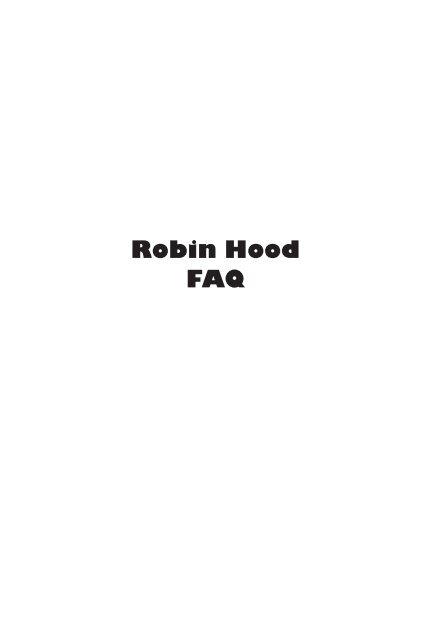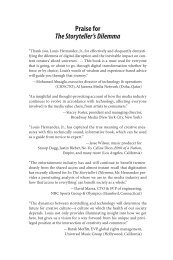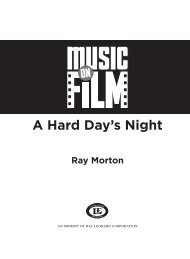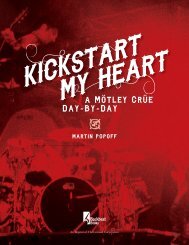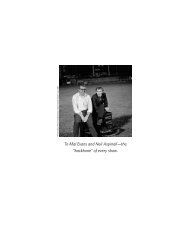Robin Hood FAQ Backwing Preview
- No tags were found...
Create successful ePaper yourself
Turn your PDF publications into a flip-book with our unique Google optimized e-Paper software.
<strong>Robin</strong> <strong>Hood</strong><br />
<strong>FAQ</strong>
<strong>Robin</strong> <strong>Hood</strong><br />
<strong>FAQ</strong><br />
All That’s Left to Know<br />
About England’s Greatest<br />
Outlaw and His Band<br />
of Merry Men<br />
Dave Thompson<br />
An Imprint of Hal Leonard LLC
Copyright © 2017 by Dave Thompson<br />
All rights reserved. No part of this book may be reproduced in any form, without<br />
written permission, except by a newspaper or magazine reviewer who wishes to<br />
quote brief passages in connection with a review.<br />
Published in 2017 by Applause Theatre & Cinema Books<br />
An Imprint of Hal Leonard LLC<br />
7777 West Bluemound Road<br />
Milwaukee, WI 53213<br />
Trade Book Division Editorial Offices<br />
33 Plymouth St., Montclair, NJ 07042<br />
All images are from the author’s collection unless otherwise noted.<br />
The <strong>FAQ</strong> series was conceived by Robert Rodriguez and developed with Stuart Shea.<br />
Printed in the United States of America<br />
Book design by Snow Creative<br />
Library of Congress Cataloging-in-Publication Data<br />
Names: Thompson, Dave, 1960 January 3– author.<br />
Title: <strong>Robin</strong> <strong>Hood</strong> <strong>FAQ</strong> : all that’s left to know about England’s greatest outlaw<br />
and his band of merry men / Dave Thompson.<br />
Description: Milwaukee : Applause Theatre & Cinema books, 2017. | Includes<br />
bibliographical references and index.<br />
Identifiers: LCCN 2016052091 | ISBN 9781495048227 (paperbck)<br />
Subjects: LCSH: <strong>Robin</strong> <strong>Hood</strong> (Legendary character) | <strong>Robin</strong> <strong>Hood</strong> (Legendary<br />
character)—In literature. | <strong>Robin</strong> <strong>Hood</strong> (Legendary character)—In motion<br />
pictures. | Outlaws—Great Britain—History—To 1500.<br />
Classification: LCC PR2129 .T56 2017 | DDC 820.9/351—dc23<br />
LC record available at https://lccn.loc.gov/2016052091<br />
www.applausebooks.com
To Captain Tobias Wilcox—gone to Barbados
Contents<br />
Acknowledgments<br />
Introduction: In Merrye Englande in Ye Days of Olde<br />
ix<br />
xi<br />
1 Riding Through the Glen: A Veritable Flock of <strong>Robin</strong>s 1<br />
2 The Rise of <strong>Robin</strong> <strong>Hood</strong>: From Tiny Yeomen, Great Earls 12<br />
Are Grown<br />
3 Earls and Elsewhere: Further Fables, Theories, and Thoughts 23<br />
4 The Death of <strong>Robin</strong> <strong>Hood</strong>: (Reports of Which Would Appear 30<br />
to Be Greatly Exaggerated)<br />
5 A Swift Historical Diversion: An Earlier <strong>Robin</strong> Awakens 38<br />
6 What Did <strong>Robin</strong> Have Against the French?<br />
7 <strong>Robin</strong> <strong>Hood</strong> and the Holiest War: A Brief History of the Crusades 53<br />
8 <strong>Robin</strong> <strong>Hood</strong> and the Band of Brothers (Part One): Introducing 65<br />
The Merry Men—the Big Three<br />
9 <strong>Robin</strong> <strong>Hood</strong> and the Band of Brothers (Part Two): Merrier 76<br />
and Merrier Still<br />
10 A Maid Called Marian: The Fairest Flower of the Forest 89<br />
11 Shooting at the Sheriff: Nottingham, Gisborne, and 98<br />
a Few Other Fiends<br />
12 <strong>Robin</strong> <strong>Hood</strong> and Religion: A Real Love/Hate Relationship 112<br />
13 Into the Woods We Go: <strong>Robin</strong> <strong>Hood</strong> and the Mystery 122<br />
of the Forest<br />
14 Another Historical Interlude: Later <strong>Robin</strong>s from Ludd 151<br />
to Courtenay<br />
15 The Ballads of Bold <strong>Robin</strong> <strong>Hood</strong>: With a Hey Nonny-no, 166<br />
to the Greenwood We Shall Go<br />
16 A <strong>Robin</strong> <strong>Hood</strong> Broadside: Later Laments and Sensational 183<br />
Sonnets<br />
17 From Ballads to Books: The Legend Continues . . . 192<br />
18 <strong>Robin</strong> <strong>Hood</strong>, the Opera: Did Somebody Mention Songs? 199<br />
19 From Sherwood to Shenandoah: <strong>Robin</strong> <strong>Hood</strong> in America 212<br />
20 The Swash is Buckled: Fairbanks and Flynn—the Merriest 223<br />
of Men
viii<br />
Contents<br />
21 Hammer and Sword: The Endless Cinema Show 235<br />
22 <strong>Robin</strong> Gets Raunchy: The Original Men In Tights 249<br />
23 <strong>Robin</strong> in Your Living Room: From Lincoln Green 263<br />
to Richard Greene<br />
Epilogue 281<br />
Appendix One: <strong>Robin</strong> in Song 285<br />
Appendix Two: <strong>Robin</strong> on Screen 305<br />
Index 331
Acknowledgments<br />
Firstly, before the swords start clashing and the arrows begin flying, thanks<br />
to all the family and friends for whom a chorus of “<strong>Robin</strong> <strong>Hood</strong>, <strong>Robin</strong><br />
<strong>Hood</strong>, riding through the glen” will never get old.<br />
Neither will “<strong>Robin</strong>nnnnnnnnnn . . . thehoodedman.”<br />
But especial thanks to Amy Hanson, for watching the movies and hearing<br />
the songs more often than anyone ought to; Jo-Ann Greene, who once<br />
drove through Sherwood Forest and thought it ought to be bigger (it was,<br />
once); Jen Swan for filling in some gaps; and Grey Malkin and Hester<br />
NicEilidh for their thoughts on Francis James Child and his ballads.<br />
To all at <strong>FAQ</strong> Central Headquarters, but most especially John Cerullo,<br />
Marybeth Keating, Wes Seeley, Lon Davis and Debra Davis; to Alan Merrill,<br />
Karen and Todd; Linda and Larry; Betsy, Steve and family; Jen; all at<br />
Captain Blue Hen in Newark; Chrissie Bentley; Dave and Sue; Tim Smith,<br />
Gaye Black, Oliver, Trevor and the King of the Deep; Barb East; Bateerz and<br />
family; the Gremlins who live in the heat pump; and to John the Superstar,<br />
the demon of the dry well.<br />
Author’s note<br />
Across the unfolding centuries, many of the names familiar in this story<br />
have undergone subtle (and sometimes, not-so-subtle) change. We can all<br />
see how Robyne (and occasionally Robert) Hode has become <strong>Robin</strong> <strong>Hood</strong>,<br />
but we may never agree on the correct way to spell Allen a Dale . . . is it Allan<br />
or Alan? Or even Allin? O’Dale or -a-Dale? Maid Marian or Marion or Maud?<br />
Is it Gisborne or Gisbourne? Scarlet or Scarlett (or Scathlock or Stukley<br />
or a myriad more variations)? Loxley or Locksley?<br />
For the most part, this book adheres to the spellings utilized by Francis<br />
James Child in his monumental The English and Scottish Ballads collection<br />
of antique verse.<br />
Those (and several more) alternate/earlier spellings live on, however, in<br />
direct quotations from, and reference to earlier manuscripts and ballads, a<br />
reminder that until the invention of the printing press began to standardize<br />
spelling and punctuation, peeple were once free too spel wurds any wey they<br />
liked. Rather like modern text messaging.
Introduction<br />
In Merrye Englande in Ye Days of Olde<br />
So it is: yet let us sing,<br />
Honour to the old bow-string!<br />
Honour to the bugle-horn!<br />
Honour to the woods unshorn!<br />
Honour to the Lincoln green!<br />
Honour to the archer keen!<br />
Honour to tight little John,<br />
And the horse he rode upon!<br />
Honour to bold <strong>Robin</strong> <strong>Hood</strong>,<br />
Sleeping in the underwood!<br />
Honour to maid Marian,<br />
And to all the Sherwood-clan!<br />
Though their days have hurried by<br />
Let us two a burden try.<br />
—John Keats, “<strong>Robin</strong> <strong>Hood</strong>”<br />
T<br />
he story is simple, and it should be familiar to all.<br />
In 1192, <strong>Robin</strong> of Loxley, the Earl of Huntingdon, returned<br />
to his English homeland from the Holy Land, where he fought<br />
gallantly alongside his king, Richard I, the Lionheart, against the Saracen<br />
hordes.<br />
Largely centered upon modern Israel, the Holy Land at that time was<br />
regarded as a realm of almost Graustarkian intrigue, romance, and violence,<br />
newly invaded by a cunning, perfidious foe who would kill a Christian<br />
as soon as look at him, but whose savagery and fighting prowess was beyond<br />
measure.<br />
It was, most westerners believed, a just war; one nobly targeted at<br />
expelling Moslems and Jews alike from the Holy Land, and preserving its
xii<br />
Introduction<br />
A captivating promotional poster for the classic 1938 Warner Bros. Technicolor production,<br />
The Adventures of <strong>Robin</strong> <strong>Hood</strong>. <br />
Photofest<br />
most sacred sites—centered upon, but by no means limited to, the city of<br />
Jerusalem—for the followers of one religion, and one religion alone.<br />
But it was also an expensive war, a conflict which levied greater and ever<br />
more punitive taxes upon the people back home; while crueler, and ever<br />
more wicked men took advantage of the king’s absence to seize power and<br />
money for themselves.<br />
For all his gallantry and religious fervor, King Richard had been no<br />
saint. He had rebelled against his father, King Henry II (1154–1189) and<br />
had himself imposed some monstrous taxes in order to finance his journey<br />
to the East.<br />
However, he was a positive paragon of virtue when compared to the<br />
man who affected to rule in his stead—Prince John, the king’s avaricious,<br />
ambitious younger brother.<br />
No matter that Richard had appointed a trusted regency to rule the<br />
country throughout his absence. He had also gifted certain areas to John,<br />
and these became the prince’s de facto kingdom.
Introduction<br />
xiii<br />
Noblemen loyal to the rightful monarch had their lands confiscated<br />
under the flimsiest of pretexts, and handed instead to men who supported<br />
the prince.<br />
Officials who refused to swear allegiance to John were likewise cast out<br />
of their positions, and replaced by more of the prince’s henchmen.<br />
Taxation was increased, ostensibly to continue financing the king’s wars,<br />
but in reality, to benefit the men who collected them.<br />
Existing laws were strengthened, new laws were introduced. Crimes<br />
that might once have merited no harsher punishment than a few hours in<br />
the stocks suddenly became capital offenses. Anything resembling “due<br />
process” was suspended, to be replaced by summary justice, meted out on<br />
the spot by the military.<br />
England was a land under siege—and the besiegers were its own<br />
government.<br />
That was the world to which <strong>Robin</strong> returned. A world which was all but<br />
unrecognizable.<br />
Loxley had certainly changed. <strong>Robin</strong> arrived in his home town to discover<br />
that his lands were now controlled by the evil Sir Guy of Gisborne;<br />
that the entire neighborhood was in thrall to a newly installed, and utterly<br />
brutal, Sheriff of Nottingham.<br />
In vain, <strong>Robin</strong> tried to reason with the usurpers, but that was an argument<br />
that he was never going to win. Instead, he was thrown into jail and,<br />
although he escaped easily enough, his situation only worsened. For now<br />
he was an outlaw . . . literally, a man who lived outside of the law, outside of<br />
the protection of the law.<br />
He could be shot on sight by anybody who wanted to claim the reward<br />
that the sheriff had placed on his head; and, if he survived capture, then<br />
he could be executed without trial.<br />
<strong>Robin</strong> fled into the depths of Sherwood Forest, the vast and sometimes<br />
impenetrable woodland that surrounded the city of Nottingham. There, he<br />
gathered together a band of similarly fated felons—a disgraced friar named<br />
Tuck; a giant of a man called Little John; Much, the son of the miller who<br />
raised <strong>Robin</strong> as a child; Allen a Dale; Will Scarlet; and Maid Marian, a ward<br />
of the Sheriff who had known <strong>Robin</strong> since childhood, and who seemed fated<br />
to be betrothed to every tyrannical nobleman in the land, but whose heart<br />
belonged to <strong>Robin</strong> alone.<br />
It was Marian’s aid that permitted <strong>Robin</strong> to survive and prosper. There<br />
could scarcely be a footfall in the castle of which she did apprise him.<br />
Information on the sheriff’s movements, the actions of his troops and, most
xiv<br />
Introduction<br />
importantly, the comings and<br />
goings through the city gates.<br />
Shipments of gold, the delivery<br />
of taxes, wealthy visitors—anything<br />
that might aid <strong>Robin</strong> in<br />
his chosen quest of robbing<br />
from the rich and giving to<br />
the poor.<br />
It’s a wonderful story, packed<br />
with action, brimming with excitement,<br />
a thrill-a-minute saga<br />
of derring do. Across the cycle<br />
of stories that relay the adventures<br />
of <strong>Robin</strong> <strong>Hood</strong>, the man<br />
in green is warrior and spy, protector<br />
of the weak, slayer of the<br />
wicked, fearless, agile, intrepid,<br />
dynamic. Scrupulously fair and<br />
unimpeachably honest. A lover<br />
and a fighter.<br />
He’s probably the bestknown<br />
outlaw in history, and<br />
Richard Greene fronts this DVD selection of <strong>Robin</strong>’s<br />
1950s television adventures.<br />
one of the most heroic, too.<br />
Nobody who learns his story,<br />
whether from printed word or moving picture, can fail to be thrilled, even<br />
inspired, by his deeds, and though one might occasionally deplore his<br />
methods, it cannot be denied that his heart is in the right place. Unless, of<br />
course, you are among the rich from whom he steals.<br />
But who was he, this robbing hood named <strong>Robin</strong> <strong>Hood</strong>?<br />
Well, he wasn’t the man we know from the stories.<br />
Not the story as we all know it, anyway.<br />
He might, indeed, have been a nobleman coming home from foreign<br />
wars, to discover his birthright had been stolen by some scheming<br />
ne’er-do-well.<br />
But he may also have been a poacher or a peasant, coerced by circumstance<br />
into a life of crime.<br />
He might have been a member of the royal court, disgraced for a crime<br />
he never committed. Or one for which he was wholly responsible.
Introduction<br />
xv<br />
He may have been the lone<br />
survivor of a doomed and<br />
deadly rebellion, he may have<br />
been an unwitting victim of<br />
some labyrinthine political<br />
conspiracy.<br />
Or he may simply have<br />
been a myth, a means of whiling<br />
away long medieval nights<br />
in the same way we might today<br />
devour Batman or James Bond.<br />
He certainly had enough adventures<br />
to place either of<br />
those characters in the shade,<br />
and that’s another thing.<br />
People have been thrilling to<br />
the stories of <strong>Robin</strong> <strong>Hood</strong> for<br />
at least seven hundred years<br />
and possibly even longer than<br />
that. Will even one of his<br />
modern counterparts still be<br />
alive and well in the year 2500?<br />
Because <strong>Robin</strong> probably<br />
will.<br />
As the star of the 1950s TV series,<br />
Richard Greene established himself among the greatest<br />
<strong>Robin</strong>s of all.<br />
Photofest<br />
The question of <strong>Robin</strong> <strong>Hood</strong>’s reality is one that this book will not be<br />
answering. Not definitively, anyway. It is a riddle, after all, that has exercised<br />
some of the most scholarly minds in the world for almost as long as <strong>Robin</strong>’s<br />
story has been told, without ever being satisfactorily resolved.<br />
This book’s belief is that he probably did. Not, perhaps, as a lincoln<br />
green–clad man in the tightest tights, swinging Tarzan-like through<br />
Sherwood Forest to relieve another posturing prince of his ill-gotten riches;<br />
nor in any of the many other guises in which literature, balladry, the stage,<br />
the movies, and TV have depicted him.<br />
But the nature of England at the time in which he lived, a nation crushed<br />
beneath an oppressive regime, taxed into poverty, yoked to near-slavery, the<br />
masses mashed beneath the armored might of a tiny, greedy elite . . . all of<br />
that demands that somebody, somewhere, should have stood up for what<br />
was “right.”
xvi<br />
Introduction<br />
Cary Elwes, starring in Mel Brooks’s 1993 satire, <strong>Robin</strong> <strong>Hood</strong>: Men in Tights. <br />
Photofest<br />
And they did. The history of the era is lousy with tales of local rebellions<br />
and would-be revolutionaries, proud freedom fighters and doughty<br />
saboteurs.<br />
Some have themselves become folk heroes, their memories living on<br />
through the passing centuries; others survive merely as footnotes to local<br />
histories and legends; and others still have been completely forgotten, their<br />
exploits expunged from the historical record by the machineries of the state<br />
which they challenged.<br />
But they all fought for what they believed was right.<br />
Any and all of them could have been “<strong>Robin</strong> <strong>Hood</strong>”—and, in some ways,<br />
any and all of them are <strong>Robin</strong> <strong>Hood</strong>.<br />
For <strong>Robin</strong> <strong>Hood</strong> does not need to have been a single man. Whether<br />
or not he existed, <strong>Robin</strong> <strong>Hood</strong> lives in the heart of everyone who has ever<br />
fought, in thought or deed, against cruelty, oppression, and authoritarian<br />
evil.<br />
Hereward the Wake, waging a one-man war against the invading<br />
Normans, a century or more before <strong>Robin</strong>’s story begins.<br />
The French Resistance, conducting their secret war against the Nazis<br />
eight hundred years later.<br />
William Wallace, fighting for the freedom of the Scots. Wat Tyler leading<br />
the peasants in revolt. Paul Revere, and his midnight ride. Ned Ludd,
Introduction<br />
xvii<br />
battling the onslaught of the Industrial Revolution. William Courtenay,<br />
leading Kentish farmers against the newly instituted Poor Laws. George<br />
Orwell’s Winston Smith, striking against Big Brother.<br />
They all effectively tell the same story, of one man against the machine,<br />
fighting for the betterment of all.<br />
A man named <strong>Robin</strong> <strong>Hood</strong>.<br />
He still lives.<br />
Just a couple of years ago, in 2015, an English housing benefit officer, distributing<br />
welfare to the local needy, was revealed to have handed out some<br />
£55,000 in bogus payments to claimants who didn’t actually qualify for the<br />
benefits. He was, said the Daily Express newspaper, “a modern <strong>Robin</strong> <strong>Hood</strong>.”<br />
So was Jamaican drug lord Christopher “Dudus” Coke. “He lives in a<br />
poor area, and because of his sale of cocaine, he basically plays the <strong>Robin</strong><br />
<strong>Hood</strong> role,” University of Miami adjunct professor David Rowe told CNN.<br />
So was another Englishman, jailed in 2009 for undertaking a six-month<br />
spree of armed robberies on banks and bookmakers. At least some of the<br />
proceeds, he claimed, would be distributed to the needy, and he even wrote<br />
a letter to the local newspaper, following one of his raids. It read: “I will continue<br />
to take from the rich and give to the poor,” and it was signed, “R. H.”<br />
Needless to say, the authorities treated these modern <strong>Robin</strong>s with<br />
scarcely more forbearance than their medieval counterpart regarded the<br />
original one. Or, for that matter, anybody who appeared to be following in<br />
his footsteps.<br />
In 1439, after the outlaw Piers Venables masterminded an audacious<br />
jailbreak in Derbyshire, a petition to Parliament in London accused:<br />
havynge no liflode ne sufficeante of goodes, gadered and assembled<br />
unto him many misdoers . . . and, in manere of insurrection, wente<br />
into the wodes in that contré, like as it hadde be Robyn-hode and<br />
his meyné.<br />
[Having no livelihood or goods, he assembled a band of many<br />
misdoers . . . and took to the woods, there to live as <strong>Robin</strong> <strong>Hood</strong><br />
and his men.]<br />
In 1441, an army of peasants took to blocking roads in the county of<br />
Norfolk, and chanting “We are Robynhodesmen—war, war, war.”<br />
In 1469, separate uprisings against the crown were led by men who<br />
called themselves <strong>Robin</strong> of Holderness and <strong>Robin</strong> of Redesdale.<br />
In 1498, one Roger Marshall was arrested after leading an uprising in<br />
the town of Willenhall, in Staffordshire. He called himself <strong>Robin</strong> <strong>Hood</strong>.
xviii<br />
Introduction<br />
And so on. In America, Bonnie and Clyde; in Australia, Ned Kelly, and<br />
in the modern world, the forces of Anonymous have all been compared to<br />
history’s favorite brigand.<br />
But <strong>Robin</strong> <strong>Hood</strong> (and his Merry Men)’s criminal tendencies are not the<br />
only quality for which they are admired.<br />
He may not be a style icon, for example, but when actress and singer<br />
Dana Gillespie first introduced her boyfriend, a young David Bowie, to<br />
her parents in 1964, “he was in Sherwood Forest <strong>Robin</strong> <strong>Hood</strong>–type suede<br />
things.”<br />
He may not be one of the world’s great romantics, but the tale of <strong>Robin</strong><br />
and his consort, Maid Marian, is one of the world’s most beloved love<br />
stories—and on stage and screen, the role has attracted some of the profession’s<br />
most beautiful actresses, just as the part of <strong>Robin</strong> <strong>Hood</strong> has lured<br />
some of its most handsome actors.<br />
He was certainly an Englishman, but he belongs to the world. <strong>Robin</strong><br />
<strong>Hood</strong>’s story is as well known in Japan and Russia as it is in the UK and the<br />
USA. In Jamaica, long before Dudus the drug lord arrived on the scene,<br />
<strong>Robin</strong> <strong>Hood</strong> was already a popular hero among the island’s disaffected,<br />
and there is a teetering pile of old reggae records to be built from the songs<br />
that invoke his memory.<br />
And, again, he may not ever have existed. But when the original edition<br />
of the British Dictionary of National Biography was published in sixty-three<br />
volumes between 1885–1900, <strong>Robin</strong> <strong>Hood</strong> was featured alongside both<br />
the greats and the ghastlies of the island story—the only figure among<br />
thousands of inclusions whose existence could not be unequivocally vouchsafed;<br />
or, as the editors of the index put it, whose “historical authenticity is<br />
ill-supported.” (<strong>Hood</strong> appears in volume twenty-seven, by the way.)<br />
Ultimately, though, none of that matters. His memory lives, his spirit<br />
lives, his legend lives. This book is the story of those lives.
<strong>Robin</strong> <strong>Hood</strong><br />
<strong>FAQ</strong>
1<br />
Riding Through<br />
the Glen<br />
A Veritable Flock of <strong>Robin</strong>s<br />
I<br />
t is one of the most diverting pastimes in modern scholastic endeavor.<br />
Who, from a multitude of possibilities, was the original <strong>Robin</strong> <strong>Hood</strong>?<br />
Nobody knows. But there are a lot of possibilities.<br />
The earliest surviving historical reference to an outlaw (or, at least, a<br />
criminal) named <strong>Robin</strong> <strong>Hood</strong> . . . not necessarily our <strong>Robin</strong> <strong>Hood</strong>, just a<br />
<strong>Robin</strong> <strong>Hood</strong> . . . dates to somewhere between the years 1213 and 1216.<br />
That was when one of the Abbot of Cirencester’s servants, a certain<br />
Robert <strong>Hood</strong>, was found guilty of murdering a man named Ralph during a<br />
quarrel in the abbot’s garden.<br />
We will accept here that the names <strong>Robin</strong> and Robert were often interchangeable<br />
in the writings of those times (as were the names Maud, Matilda,<br />
and Marian).<br />
It’s a pleasant coincidence of names, but it is a long jump between<br />
what appears to have been a common killer and an heroic freedom<br />
fighter . . . even longer than the distance between Cirencester, deep in the<br />
heart of the Cotswolds, and Yorkshire and Nottingham, <strong>Hood</strong>’s traditional<br />
stomping grounds.<br />
Safely we can say this was not our man, just as he is unlikely to have been<br />
any of the other <strong>Robin</strong> <strong>Hood</strong>s whose thirteenth century existence has been<br />
vouchsafed by sundry other historical documents. The fact is, <strong>Robin</strong>hood<br />
(all one word) appears to have been a reasonably common surname.<br />
No matter. We find another just a decade later in Yorkshire, deep within<br />
the records of the periodic courts, or assizes, that were held around the<br />
country, at which traveling magistrates would distribute justice upon the<br />
felons of the realm. There we learn that one “Robert Hod, fugitive,” who<br />
also went by the name of Hobbehod, had been forced to forfeit “chattels”
2<br />
<strong>Robin</strong> <strong>Hood</strong> <strong>FAQ</strong><br />
(property) to the not-inconsiderable value of one pound, twelve shillings,<br />
and sixpence, in partial payment of a debt to the Liberty of St. Peter’s York.<br />
There is also a strong body of opinion that then links the unfortunate<br />
“Robert Hod, fugitive” to another local criminal, Robert of Wetherby<br />
“outlaw and evildoer of our land”—a man whose capture and execution<br />
ultimately cost the local judiciary some six pounds, ten shillings, or four<br />
times the value of the confiscated chattels.<br />
We know not precisely from what, aside from debt, Robert Hod may have<br />
been a fugitive. Nor of what evil doings the evildoer Robert of Wetherby<br />
might have been guilty. But one fact is assured. Leading the hunt for this<br />
miscreant was Eustace of Lowdham, now the Sheriff of Yorkshire but,<br />
hitherto, the deputy sheriff of the neighboring county of Nottinghamshire.<br />
Robert Hod? The sheriff of Nottinghamshire? It’s almost too good to<br />
be true.<br />
And so it is. Robert Hod is revealed as the historical record’s first possible<br />
<strong>Robin</strong> <strong>Hood</strong>. But he is not its last.<br />
The View from North of the Border<br />
In court documents dating from half a century later, in 1262, one William<br />
le Fevre, an outlaw in the county of Berkshire, was named as William<br />
Robehod; while another candidate (or, as the law might put it, suspect) for<br />
the role of the real-life <strong>Robin</strong> is found lurking within that vast historical<br />
tract known today as Wyntoun’s Chronicle of Scotland, written around 1420.<br />
Andrew of Wyntoun was both a poet and a holy man, a canon of St.<br />
Andrews, near Dundee in Scotland. Written largely, and most impressively,<br />
in eight-syllable couplets, his Orygynale Cronykil of Scotland is the oldest history<br />
of that land known to survive today, its span reaching from the earliest<br />
days of myth and fable to what Andrew knew as “the present day,” the death<br />
of the Duke of Albany, Robert Stewart, in 1420.<br />
Scrupulously dated, it covers, also, noteworthy events taking place south<br />
of the border in northern England and, for 1283, Andrew writes<br />
Lytill Ihon and Robyne Hude<br />
Waythmen ware commendyd gude;<br />
In Yngilwode and Barnysdale<br />
Thai oysyd all this tyme thare trawale<br />
—meaning that the two men, Little John and <strong>Robin</strong> <strong>Hood</strong>, were widely<br />
regarded as “wight yeomen” or good hunters, and were familiar sights<br />
around Inglewood and Barnsdale, in the bordering county of Cumberland.
Riding Through the Glen 3<br />
Certainly, the coincidence of those two names<br />
is one to conjure with. But are these really our<br />
men? Merely hunting well is scarcely a qualification<br />
for becoming history’s greatest outlaw.<br />
Nevertheless, Scottish historians remained<br />
fascinated by <strong>Robin</strong> <strong>Hood</strong>. A couple of decades<br />
later, another Scots chronicler, Walter of Bower,<br />
placed <strong>Robin</strong> in the forefront of one of the periodic<br />
rebellions that shook his nation’s southern<br />
neighbor during the reign of King Henry III<br />
(1216–1272), the successor to evil King John.<br />
In 1263, a disaffected baron, Simon de<br />
Montfort, made a serious play for the throne, rallying<br />
a vast army—the so-called “disinherited”—<br />
to his standard, and marching against the king.<br />
At first, all went well—Henry himself was captured,<br />
alongside his son Edward, at the Battle<br />
of Lewes, in 1264. But Edward escaped and, regrouping<br />
the army, routed the rebels in turn at<br />
the Battle of Evesham. Simon de Montfort was<br />
killed, Henry was restored to the throne, and the<br />
rebel army scattered to the winds.<br />
Simon de Montfort led one of the<br />
rebellions that may have produced<br />
the true <strong>Robin</strong> <strong>Hood</strong>.<br />
According to Walter of Bower’s Scotchronicon, <strong>Robin</strong> <strong>Hood</strong> was one of<br />
those soldiers, a “famosus siccarius” (a well-known cutthroat), and one<br />
whose fame, it seems, lived on. For, almost two centuries later, Bower complained,<br />
“[F]oolish people are inordinately fond of celebrating [him] in<br />
tragedy and comedy,” a reference we cannot help but immediately relate<br />
to the multitude of <strong>Robin</strong>-related ballads and plays that we know were<br />
circulating at that time.<br />
Bower then repeats some of <strong>Robin</strong> <strong>Hood</strong>’s most notable achievements.<br />
Once on a time, when, having incurred the anger of the king and<br />
the prince, he could hear mass nowhere but in Barnsdale, while he<br />
was devoutly occupied with the service, (for this was his wont, nor<br />
would he ever suffer it to be interrupted for the most pressing occasion,)<br />
he was surprised by a certain sheriff and officers of the king,<br />
who had often troubled him before, in the secret place in the woods<br />
where he was engaged in worship as aforesaid. Some of his men,<br />
who had taken the alarm, came to him and begged him to fly with<br />
all speed. This, out of reverence for the host, which he was then<br />
most devoutly adoring, he positively refused to do. But while the
4<br />
<strong>Robin</strong> <strong>Hood</strong> <strong>FAQ</strong><br />
rest of his followers were trembling for their lives, Robert, confiding<br />
in Him whom he worshipped, fell on his enemies with a few who<br />
chanced to be with him, and easily got the better of them; and<br />
having enriched himself with their plunder and ransom, he was led<br />
With Jonas Armstrong as <strong>Robin</strong>, the BBC’s 2006 TV series both updated the saga and<br />
stayed true to its roots.
9<br />
<strong>Robin</strong> <strong>Hood</strong> and<br />
the Band of Brothers<br />
(Part Two)<br />
Merrier and Merrier Still<br />
I’ll give thee, good fellow, a twelvemonth or twain,<br />
To search Europe through, from Byzantium to Spain;<br />
But ne’er shall you find, should you search till you tire,<br />
So happy a man as the Barefooted Friar.<br />
Your knight for his lady pricks forth in career,<br />
And is brought home at even-song prick’d through with a spear;<br />
I confess him in haste—for his lady desires<br />
No comfort on earth save the Barefooted Friar’s.<br />
Your monarch?—Pshaw! many a prince has been known<br />
To barter his robes for our cowl and our gown,<br />
But which of us e’er felt the idle desire<br />
To exchange for a crown the grey hood of a Friar!<br />
The Friar has walk’d out, and where’er he has gone,<br />
The land and its fatness is mark’d for his own;<br />
He can roam where he lists, he can stop when he tires,<br />
For every man’s house is the Barefooted Friar’s.<br />
He’s expected at noon, and no wight till he comes<br />
May profane the great chair, or the porridge of plums<br />
For the best of the cheer, and the seat by the fire,<br />
Is the undenied right of the Barefooted Friar.<br />
He’s expected at night, and the pasty’s made hot,<br />
They broach the brown ale, and they fill the black pot,<br />
And the goodwife would wish the goodman in the mire,<br />
Ere he lack’d a soft pillow, the Barefooted Friar.<br />
Long flourish the sandal, the cord, and the cope,<br />
The dread of the devil and trust of the Pope;<br />
For to gather life’s roses, unscathed by the briar,<br />
Is granted alone to the Barefooted Friar.<br />
—Sir Walter Scott, Ivanhoe
<strong>Robin</strong> <strong>Hood</strong> and the Band of Brothers (Part Two) 77<br />
Little John, Will Scarlet and Much Miller were <strong>Robin</strong>’s first accredited<br />
followers. Others, however, swiftly followed them into Sherwood Forest,<br />
there to make merry and torment authority.<br />
Some were (or would become) renowned fighters, some were destined<br />
for other fates. But only one was a man of God, and a figure of fun as well.<br />
Which says a lot, despite the piety of the age, for the opinion of the common<br />
man when it came to respecting the clergy.<br />
Friar Tuck<br />
It is strange, when one considers the renown of Friar Tuck, to discover that<br />
his arrival in the legend came somewhat late in the day. Absent from any of<br />
the earliest ballads, the first-known appearances of the paunchy priest date<br />
from the sixteenth century.<br />
Medieval village life at that time was often highlighted by a fair, usually<br />
taking place around the traditional May Day festivities, and inevitably<br />
featuring some kind of play about <strong>Robin</strong> <strong>Hood</strong>—such tales of heroism not<br />
only appealed from a storytelling point of view, after all. As we shall see<br />
These one-seventy-second-scale Merry Men were a staple ingredient in any 1960s English child’s<br />
toy box.
78<br />
<strong>Robin</strong> <strong>Hood</strong> <strong>FAQ</strong><br />
shortly, they were also a grand vehicle for satirical comment on the lives of<br />
the villagers, too.<br />
Why May Day? According to Mary I. Curtis, author of England of Song<br />
and Story, a positively shimmering history of the country’s traditions that<br />
was first published in 1932, it was because May 1 “was supposed to be the<br />
anniversary of [<strong>Robin</strong>’s] death.”<br />
Often, the games served not only as an entertainment; they were also<br />
a charity drive, with <strong>Robin</strong> and his men collecting money for the poor.<br />
Neither did their ministrations always pass off peaceably. In 1497 in<br />
Staffordshire, <strong>Robin</strong> <strong>Hood</strong> rode into a neighboring town at the head of<br />
some one hundred followers, and proceeded to beat up anybody who would<br />
not give them money. And this was not the only example of that.<br />
Nevertheless, the popularity of these celebrations could never be questioned,<br />
outweighing even the power of the Church in the mind of the<br />
populace. As the sixteenth century Bishop Latimer discovered to his chagrin.<br />
Preaching a sermon on the decline of religion in 1549, and recalling<br />
an event from perhaps ten years earlier, the notoriously antithalian prelate<br />
grumbled bitterly,<br />
I came myself once to a place, riding on a journey homeward<br />
from London, and I sent word over night into the town that I<br />
would preach there in the morning, because it was a holiday, and<br />
methought it was an holiday’s work. The church stood in my way,<br />
and I took my horse and my company and went thither. I thought I<br />
should have found a great company in the church, and when I came<br />
there the church door was fast locked. I tarried there half an hour<br />
and more; at last the key was found, and one of the parish comes to<br />
me and says “Sir, this is a busy day with us, we cannot hear you; it is<br />
<strong>Robin</strong> <strong>Hood</strong>’s day. The parish are gone abroad to gather for <strong>Robin</strong><br />
<strong>Hood</strong> . . . “ I was fain there to give place to <strong>Robin</strong> <strong>Hood</strong>.<br />
Perhaps somebody in the congregation, which included the young King<br />
Edward VI, smiled at this thought, but Latimer did not share the joke.<br />
It is no laughing matter . . . it is a weeping matter, a heavy matter,<br />
under the pretense of gathering for <strong>Robin</strong> <strong>Hood</strong>, a traitor and<br />
a thief, to put out a preacher, to have his office less esteemed; to<br />
prefer <strong>Robin</strong> <strong>Hood</strong> before the ministrations of God’s word. . . .<br />
This realm has been ill provided for, ere it hath had such corrupt<br />
judgments in it to prefer <strong>Robin</strong> <strong>Hood</strong> to God’s word.<br />
The disapproval of the Church notwithstanding, these plays were riotously<br />
successful; and, of course, every aspiring thespian in the village would
<strong>Robin</strong> <strong>Hood</strong> and the Band of Brothers (Part Two) 79<br />
demand a role. It is likely here, in fact, that the numbers of the Merry Men<br />
first began to swell, as fresh roles were invented to accommodate every<br />
would-be player.<br />
Friar Tuck was paramount among these new inclusions, and clearly<br />
a popular one, too. Soon, he was as permanent a member of the gang as<br />
any of his longer-established comrades, and though he seems to have had<br />
little purpose beyond providing a little light relief (usually revolving either<br />
around his girth, or his gluttony), such qualities were welcomed into the<br />
legend.<br />
All of which makes it seem somehow remarkable that Friar Tuck was<br />
based upon a real-life, and historically recorded character.<br />
The first surviving mention of a “Frere Tuk” in the <strong>Robin</strong> <strong>Hood</strong> legends<br />
dates from around 1475, and a fragment of a contemporary play. Around<br />
fifty years earlier, however, it was not the stage that the Friar graced with<br />
his corpulent presence, it was the annals of English crime.<br />
For over a decade in the early fifteenth century, southern England was<br />
blighted by an outlaw gang led by a former holy man, Richard Stafford, once<br />
the chaplain at the church in Lindfield in Sussex—although he was better<br />
known to his pursuers by his chosen nom-de-nasty, Frere Tuk.<br />
We know next to nothing about his actual felonies, and can only guess<br />
at what foul calumnies were enacted by this fallen priest. But the concept<br />
of a man of God turning to crime was one that would surely have<br />
thrilled and intrigued all who heard it. The public’s insatiable appetite<br />
for salacity and scandal is not, after all, a recent development, and where<br />
there is an appetite, there is usually somebody willing to assuage it—<br />
today, in the form of newspapers and television; back then, via ballad and<br />
storytelling.<br />
Tuck’s transition from fact to fable is not itself unusual. Paul Clifford<br />
and Dick Turpin, the notorious eighteenth century highwaymen whose<br />
respective adventures fired novelists Edward Bulwer-Lytton and Harrison<br />
Ainsworth’s imaginations, both existed (the former as an archetype, if not<br />
an actual person), and the legend and renown in which Turpin continues to<br />
revel today is derived wholly from the text of Ainsworth’s Rookwood.<br />
Drawn from life, too, were those other heroes of Victorian literature—<br />
the housebreaker Jack Sheppard, the murderous scholar Eugene Aram,<br />
and the killer poet Richard Savage. Likewise Fagin, the wily old crook who<br />
engineers Oliver Twist’s downfall in the greatest of Dickens’s earliest novels;<br />
and Charlie Peace, the nineteenth century murderer who became the hero<br />
of twentieth century movies and comic strips alike.


